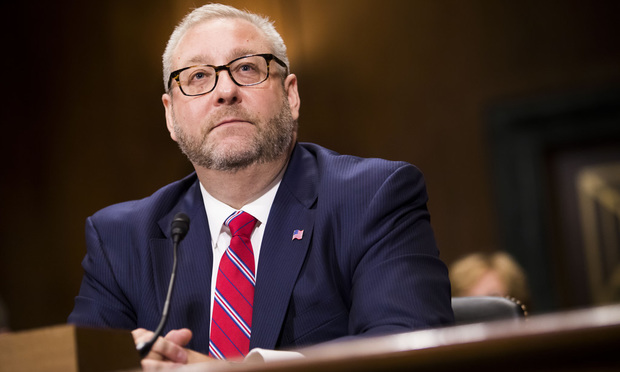 U.S. Justice Department in Washington. Credit: Mike Scarcella / NLJ
U.S. Justice Department in Washington. Credit: Mike Scarcella / NLJ
White-collar defense lawyers, a year into the Trump administration, say they are largely in the dark about federal enforcement priorities, with few tea leaves to read as top posts at the U.S. Justice Department and other agencies remain unfilled.
“Strikingly, after a full year, it remains very hard to say anything definitive about likely developments in the white collar arena under the current administration,” a team of attorneys at Wachtell, Lipton, Rosen & Katz said in a recent post on the New York University School of Law’s “Compliance & Enforcement” blog. “One reason for this is the slow pace at which President Trump is filling key positions at Main Justice and in individual United States Attorney’s Offices across the country.”
Still, there are some clues about where the Trump administration’s enforcers might be headed—or not going. Jones Day published a report this week showing—with several caveats—reduced enforcement of the federal anti-foreign bribery law.
The Justice Department and U.S. Securities and Exchange resolved five Foreign Corrupt Practices Act cases with corporations in 2017—the lowest single-year total in a decade, according to the Jones Day report. Under the final three weeks of the Obama administration, in January 2017, the Justice Department and SEC resolved six corporate FCPA cases, reflecting perhaps a last-minute rush to avoid the uncertainty of new leadership.
Eighteen companies publicly reported receiving FCPA declinations last year—an increase from the 13 that were reported between January 2016 and Jan. 20, 2017.
Jones Day partner Hank Bond Walther cautioned that any conclusions remain elusive. More than six months after being nominated to lead the Justice Department’s criminal division, Kirkland & Ellis partner Brian Benczkowski is still awaiting confirmation by the U.S. Senate.
 Brian Benczkowski testifies at his confirmation hearing in 2017. Credit: Diego M. Radzinschi / NLJ
Brian Benczkowski testifies at his confirmation hearing in 2017. Credit: Diego M. Radzinschi / NLJ
“You don’t yet have anybody speaking for the new administration in the most important FCPA enforcement policy role in the Justice Department,” Walther, a co-author of the firm’s FCPA report, said.
Still, the Justice Department hasn’t ignored the FCPA outright. “The FCPA is the law of the land. We will enforce it against both foreign and domestic companies that avail themselves of the privileges of the American marketplace,” Rod Rosenstein, the deputy attorney general, said in remarks in November.
Rosenstein last year pushed out revised foreign-bribery enforcement guidance that effectively made permanent an Obama-era pilot program that was aimed at incentivizing voluntary disclosure of misconduct. The guidance creates a new presumption that the Justice Department will not bring charges against companies that meet certain compliance standards and disgorge ill-gotten profits.
“The announcement of DOJ’s new corporate FCPA policy in November 2017, indicates to me that the significant drop [in corporate enforcement actions] isn’t an anomaly,” Walther said. “The Justice Department may have been making the same type of corporate charging and declination decisions even before the new policy was announced.”
Even with a drop in federal enforcement, companies cannot necessarily rest easy. In its FCPA white paper, Jones Day said “foreign regulators are increasingly investigating and punishing companies that participate in bribery.”
The Wachtell team, including partners John Savarese, Ralph Levene and Wayne Carlin, noted in their review that six of 1 6sections in the DOJ’s Criminal Division are being led by acting chiefs. The defense lawyers also noted that some prominent U.S. attorney offices—including prosecution shops in Manhattan and Brooklyn—have interim leaders.
“Until these positions are filled, and new leaders have an opportunity to establish themselves, it will be difficult to determine DOJ’s overall approach to white-collar enforcement with any assurance,” the Wachtell lawyers said.
Read more:
‘Don’t Talk,’ and Other Advice for Trump From White-Collar Lawyers
Who Is Zack Harmon, New Chief of Staff to FBI Director Wray?
Don’t Call It the ‘Rosenstein Memo,’ but DOJ Just Revised Its FCPA Guidance.
DOJ’s New FCPA Enforcement Policy: Clarity for Companies and a Warning for Individuals



